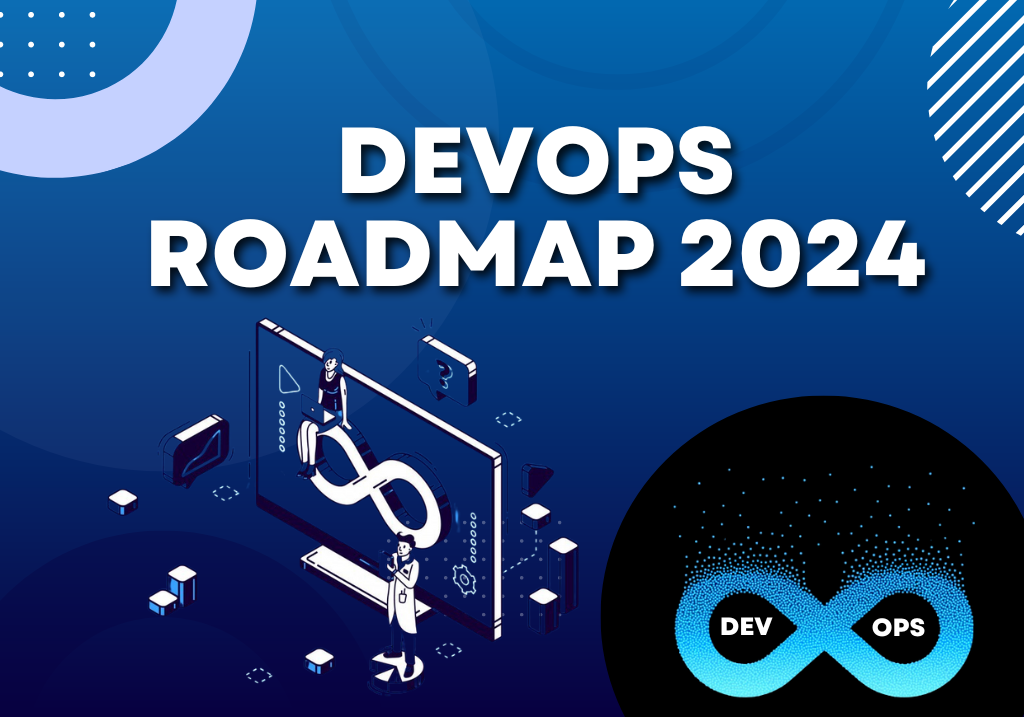Introduction of DevOps:
Explore the future of DevOps in Ethans Tech latest blog post, ‘DevOps Roadmap 2024’. Learn about the latest trends and tools shaping the industry. DevOps encompasses a collection of methodologies, beliefs, and practices geared towards enhancing teamwork and communication between software development (Dev) and IT operations (Ops) teams. Its primary objective is to dismantle the conventional barriers separating these departments, thereby facilitating swifter and more dependable software delivery and deployment.
In simpler terms, DevOps strives to unite developers and operations professionals, encouraging collaborative efforts across the entirety of the software development journey. This joint approach results in expedited development timelines, prompt implementation of new functionalities, and heightened software quality.
At its essence, DevOps underscores the importance of automation, continuous integration and delivery (CI/CD), infrastructure as code (IaC), and fostering a culture of mutual responsibility and transparency. Ultimately, the overarching aim of DevOps is to optimize the software delivery pipeline, enhance operational efficiency, and consistently deliver value to end-users with greater speed and reliability.
Imagine you’ve got a team of builders constructing a skyscraper. Each builder has their own job: some lay bricks, some install windows, and some do the plumbing. Now, imagine if these builders never talked to each other. Chaos, right? That’s where DevOps comes in.
Here DevOps is like the glue that holds together a team of builders, but in the world of software. It’s a way of working where developers (the folks who write code) and operations (the folks who make sure the code runs smoothly) work together seamlessly. So, what does a DevOps engineer do? Well, they’re like the conductor of an orchestra. They make sure everyone is playing the right tune at the right time. They write scripts to automate boring tasks, set up tools to monitor how well the software is working, and help developers deploy their code safely and quickly.
In simple terms, DevOps is all about teamwork, efficiency, and making sure software runs like a well-oiled machine. And a DevOps engineer? They’re the mastermind behind it all, making sure everything runs smoothly from start to finish. If you want to become the mastermind behind smooth software operation then checkout Ethan’s Tech DevOps classes and start your journey today!
Scopes for job in DevOps in the today’s market
The current job market for DevOps professionals is flourishing within today’s technological landscape. Below are several significant factors driving this trend:
1. Increasing Adoption of DevOps Principles:
Many companies are embracing DevOps methodologies to enhance collaboration, streamline operations, and expedite software delivery. This widespread uptake has fueled a surge in demand for DevOps engineers.
2. Swift Digital Transformation:
As businesses undergo extensive digital overhauls across diverse sectors, the demand for DevOps expertise is escalating. These professionals are sought-after for managing intricate IT infrastructures, automating tasks, and ensuring seamless deployment of digital solutions.
3. Expansion in Cloud Computing:
The proliferation of cloud computing platforms such as AWS, Azure, and Google Cloud has prompted organizations to seek DevOps specialists. These professionals are tasked with optimizing cloud infrastructure, implementing DevOps practices in cloud environments, and harnessing cloud-native technologies.
4. Transition to Microservices and Containers:
The shift towards microservices architecture and containerization tools like Docker and Kubernetes has opened up new avenues for DevOps engineers. They are instrumental in orchestrating, managing, and scaling containerized applications efficiently.
5. Emphasis on Automation and Efficiency:
Automation lies at the core of DevOps, driving the need for professionals capable of automating tasks, streamlining workflows, and enhancing operational efficiency throughout the software development lifecycle.
6. Rising Demand for Continuous Integration/Continuous Deployment (CI/CD):
CI/CD pipelines play a pivotal role in delivering software updates swiftly and reliably. Consequently, DevOps engineers proficient in setting up and optimizing CI/CD pipelines are highly sought-after to help organizations expedite time-to-market.
7. Adoption of DevSecOps for Enhanced Security:
The integration of security into the DevOps process, known as DevSecOps, is gaining traction. There is a growing requirement for DevOps professionals adept at implementing security best practices, automating security testing, and ensuring compliance across the software development lifecycle.
Importance of DevOps
The importance of DevOps stems from its ability to address key challenges faced by modern software development and IT operations teams. Here are some reasons why DevOps is crucial:
1. Faster Time-to-Market:
DevOps practices enable organizations to release software updates and new features more rapidly. By automating processes, streamlining workflows, and fostering collaboration between development and operations teams, DevOps reduces deployment times and accelerates time-to-market for products and services.
2. Improved Collaboration and Communication:
DevOps promotes a culture of collaboration and communication between development, operations, and other cross-functional teams. By breaking down silos and encouraging shared responsibility, DevOps fosters a collaborative environment where teams can work together seamlessly to achieve common goals.
3. Enhanced Quality and Reliability:
DevOps emphasizes continuous integration, continuous testing, and continuous delivery (CI/CD), leading to higher software quality and reliability. By automating testing and deployment processes, DevOps helps identify and fix issues earlier in the development lifecycle, resulting in more stable and resilient applications.
4. Increased Efficiency and Productivity:
Automation is a core principle of DevOps, allowing teams to automate repetitive tasks, such as code deployment, infrastructure provisioning, and testing. This automation reduces manual effort, minimizes errors, and increases overall efficiency and productivity.
5. Scalability and Flexibility:
DevOps practices enable organizations to scale their infrastructure and applications more effectively to meet changing business needs. By leveraging cloud computing, containerization, and infrastructure as code (IaC), DevOps provides the scalability and flexibility required to support dynamic and rapidly evolving environments.
6. Cost Savings:
DevOps helps organizations optimize resource utilization, reduce downtime, and minimize waste, resulting in cost savings. By automating processes and improving efficiency, DevOps helps organizations achieve better ROI on their IT investments and reduce overall operational costs.
7. Improved Customer Satisfaction:
Ultimately, DevOps is focused on delivering value to customers more rapidly and consistently. By enabling faster delivery of high-quality software and responding quickly to customer feedback, DevOps helps improve customer satisfaction and loyalty.
Competition for DevOps jobs in today’s market:
In 2024, the competition for DevOps jobs is expected to remain high due to several factors driving demand for skilled professionals in this field:
- Continued Embrace of DevOps Practices: Organizations across industries are increasingly adopting DevOps principles to improve their software delivery processes, enhance collaboration between development and operations teams, and accelerate time-to-market for products and services. As DevOps becomes more ingrained in organizational culture, the demand for skilled DevOps professionals continues to grow.
- Rapid Technological Advancements: The technology landscape is evolving at a rapid pace, with advancements in areas such as cloud computing, containerization, microservices architecture, and automation. DevOps professionals with expertise in these areas are highly sought after by organizations looking to modernize their IT infrastructure and stay competitive in the market.
- Shift Towards Cloud-Native Solutions: The shift towards cloud-native development and deployment is driving demand for DevOps professionals who can design, implement, and manage cloud-based infrastructure and applications. As more organizations migrate their workloads to the cloud, there is a growing need for DevOps engineers with expertise in cloud platforms such as AWS, Azure, and Google Cloud.
- Focus on Security and Compliance: With cybersecurity threats on the rise and increased regulatory requirements, organizations are prioritizing security and compliance in their DevOps processes. DevOps professionals who can integrate security best practices into their workflows and ensure compliance with industry standards are in high demand.
- Shortage of Skilled Talent: Despite the growing demand for DevOps professionals, there remains a shortage of skilled talent in the market. Organizations are competing for top talent with specialized skills in areas such as automation, CI/CD, infrastructure as code (IaC), and container orchestration. As a result, qualified DevOps professionals are often in a strong position to negotiate competitive salaries and benefits.
- Increasing Demand for Automation Expertise: As DevOps practices become more widespread, there’s a growing demand for professionals skilled in automation tools and techniques. Companies are seeking individuals who can automate repetitive tasks, streamline workflows, and improve efficiency across the software development lifecycle.
- Rise of DevSecOps: With the growing importance of security and compliance in today’s digital landscape, there’s a rising demand for DevSecOps professionals who can integrate security practices into the DevOps pipeline. Companies are looking for individuals who can ensure that security is built into every stage of the software development process, from code development to deployment and beyond.
- Need for Hybrid Skill Sets: As DevOps evolves, there’s an increasing need for professionals with hybrid skill sets who can bridge the gap between development and operations. Companies are looking for individuals who not only have technical expertise but also possess strong communication, collaboration, and problem-solving skills to effectively work across teams and drive DevOps initiatives forward.
- Emphasis on Continuous Learning: In today’s rapidly evolving technology landscape, there’s a growing emphasis on continuous learning and upskilling among DevOps professionals. Companies are seeking individuals who are committed to staying updated on the latest trends, tools, and practices in DevOps and are proactive in seeking out new learning opportunities to enhance their skills and knowledge.
- Focus on Cultural Transformation: While technology plays a critical role in DevOps, there’s also a growing recognition of the importance of cultural transformation in driving successful DevOps initiatives. Companies are looking for individuals who can foster a culture of collaboration, communication, transparency, and shared responsibility across teams, as this cultural shift is essential for unlocking the full potential of DevOps and driving organizational success.
Understanding DevOps in 2024
Understanding DevOps in 2024 involves several key steps to stay abreast of the latest trends and practices in this rapidly evolving field. Here are some steps to consider:
- Familiarize Yourself with DevOps Principles: Begin by gaining a solid understanding of the core principles and concepts of DevOps, including continuous integration, continuous delivery, automation, collaboration, and culture. This foundation will provide you with a framework for understanding how DevOps practices are applied in real-world scenarios.
- Stay Updated on Emerging Technologies: DevOps is closely intertwined with emerging technologies such as cloud computing, containerization, microservices, serverless computing, and AI/ML. Stay informed about the latest developments in these areas and how they impact DevOps practices.
- Learn DevOps Tools and Technologies: Familiarize yourself with popular DevOps tools and technologies used for automation, orchestration, monitoring, and collaboration. This includes tools such as Docker, Kubernetes, Jenkins, GitLab, Ansible, Terraform, and Prometheus, among others.
- Explore Cloud-Native DevOps Practices: With the increasing adoption of cloud computing, understanding cloud-native DevOps practices is essential. Learn about cloud platforms such as AWS, Azure, and Google Cloud, as well as cloud-native development practices and tools.
- Understand DevOps Culture and Collaboration: DevOps is as much about culture and collaboration as it is about technology. Learn about the importance of fostering a culture of collaboration, communication, transparency, and shared responsibility across development and operations teams.
- Gain Hands-On Experience: Practical experience is invaluable for understanding DevOps in action. Look for opportunities to work on real-world projects, participate in DevOps-related initiatives within your organization, or contribute to open-source projects.
- Join DevOps Communities and Networks: Engage with the DevOps community through online forums, social media, meetups, conferences, and workshops. Participating in discussions, sharing knowledge, and networking with peers can provide valuable insights and support.
- Continuous Learning and Adaptation: DevOps is a continuously evolving field, so commit to lifelong learning and adaptation. Stay curious, seek out new learning opportunities, experiment with new tools and practices, and be open to adopting new approaches that can improve your DevOps skills and knowledge.
Future of DevOps:
- Sustained Expansion: DevOps isn’t just a trend; it’s becoming the norm in software development. More and more companies are realizing the benefits of DevOps practices like automation, collaboration, and faster delivery. This means there will be a steady demand for DevOps professionals in the coming years.
- Integration with Emerging Technologies: DevOps will continue to evolve alongside emerging technologies like artificial intelligence (AI), machine learning (ML), and Internet of Things (IoT). As these technologies become more widespread, DevOps practices will adapt to accommodate them, opening up new opportunities for innovation and efficiency.
- Focus on Security and Compliance: With cybersecurity threats becoming increasingly sophisticated and regulations tightening around data privacy and compliance, DevOps will place greater emphasis on security and compliance. This means DevOps professionals will need to become more adept at integrating security into every stage of the software development lifecycle.
- Shift to Cloud-Native and Serverless Architectures: As organizations embrace cloud computing and serverless architectures, DevOps will need to adapt to these new paradigms. This includes managing cloud infrastructure, optimizing cloud-native applications, and leveraging serverless technologies for greater scalability and cost efficiency.
- Culture and Collaboration: While technology plays a crucial role in DevOps, the culture of collaboration and continuous improvement is equally important. The future of DevOps will see organizations investing more in creating a culture of trust, transparency, and shared responsibility across development and operations teams.
- Automation Everywhere: Automation will continue to be a central theme in DevOps. From automating repetitive tasks to implementing self-healing systems, DevOps professionals will rely on automation to drive efficiency, reduce errors, and free up time for more strategic work.
Pros & Cons of DevOps/ Advantages and Disadvantages of DevOps
| Pros of DevOps | Cons of DevOps |
| 1. Quicker Time-to-Market: DevOps methodologies enable organizations to swiftly release software updates and introduce new features. | 1. Initial Investment: Implementing DevOps practices requires a significant initial investment. |
| 2. Enhanced Collaboration: DevOps fosters a culture of collaboration among development, operations, and other teams. | 2. Complexity: DevOps introduces complexity into processes, especially for organizations with legacy systems. |
| 3. Improved Quality and Reliability: DevOps emphasizes continuous integration and testing, resulting in higher software quality. | 3. Cultural Resistance: Adopting a DevOps culture may face resistance from employees accustomed to traditional roles. |
| 4. Heightened Efficiency and Productivity: Automation in DevOps reduces manual effort and increases overall efficiency. | 4. Security Concerns: DevOps practices can introduce security risks if not implemented properly. |
| 5. Enhanced Scalability and Flexibility: DevOps enables organizations to scale their infrastructure effectively. | 5. Dependency on Automation: DevOps relies heavily on automation, introducing dependency on tools and scripts. |
| 6. Cost-Efficiency: DevOps optimizes resource utilization, resulting in cost savings for organizations. | 6. Lack of Standardization: DevOps practices vary widely across organizations, leading to a lack of standardization. |
| 7. Improved Customer Satisfaction: DevOps delivers value to customers more rapidly, enhancing customer satisfaction. | 7. Overemphasis on Speed: There can be a tendency to prioritize speed over other factors such as quality and stability. |
Conclusion:
In conclusion, DevOps Roadmap in 2024 will continue to be a transformative force in the software development and IT operations landscape. With the increasing demand for agility, efficiency, and innovation, DevOps principles and practices will remain essential for organizations striving to succeed in today’s fast-paced and digital world.
Looking forward, several key trends will shape the future of DevOps:
- Integration with Emerging Technologies: DevOps will evolve alongside emerging technologies like cloud computing, containerization, microservices, AI/ML, and serverless computing, enabling organizations to streamline development processes and deliver value to customers more rapidly.
- Focus on Security and Compliance: DevOps will emphasize security and compliance, with organizations integrating security best practices into their workflows and adopting tools to ensure the security and compliance of their applications and infrastructure.
- Cultural Transformation: DevOps will continue to focus on fostering a culture of collaboration and shared responsibility across teams, driving innovation and success in DevOps initiatives.
- Automation Everywhere: Automation will remain central to DevOps, with organizations leveraging automation tools to streamline workflows and improve efficiency across the software development lifecycle.
- Continuous Learning and Improvement: DevOps professionals will embrace a mindset of continuous learning and adaptation to stay ahead of the curve, driving innovation and success in their organizations.
In summary, DevOps Roadmap in 2024 represents a convergence of technology, culture, and practices aimed at accelerating software delivery, improving collaboration, and driving business value. By embracing these trends and committing to continuous learning and improvement, organizations can position themselves for success in the dynamic and competitive landscape of DevOps in 2024 and beyond.





